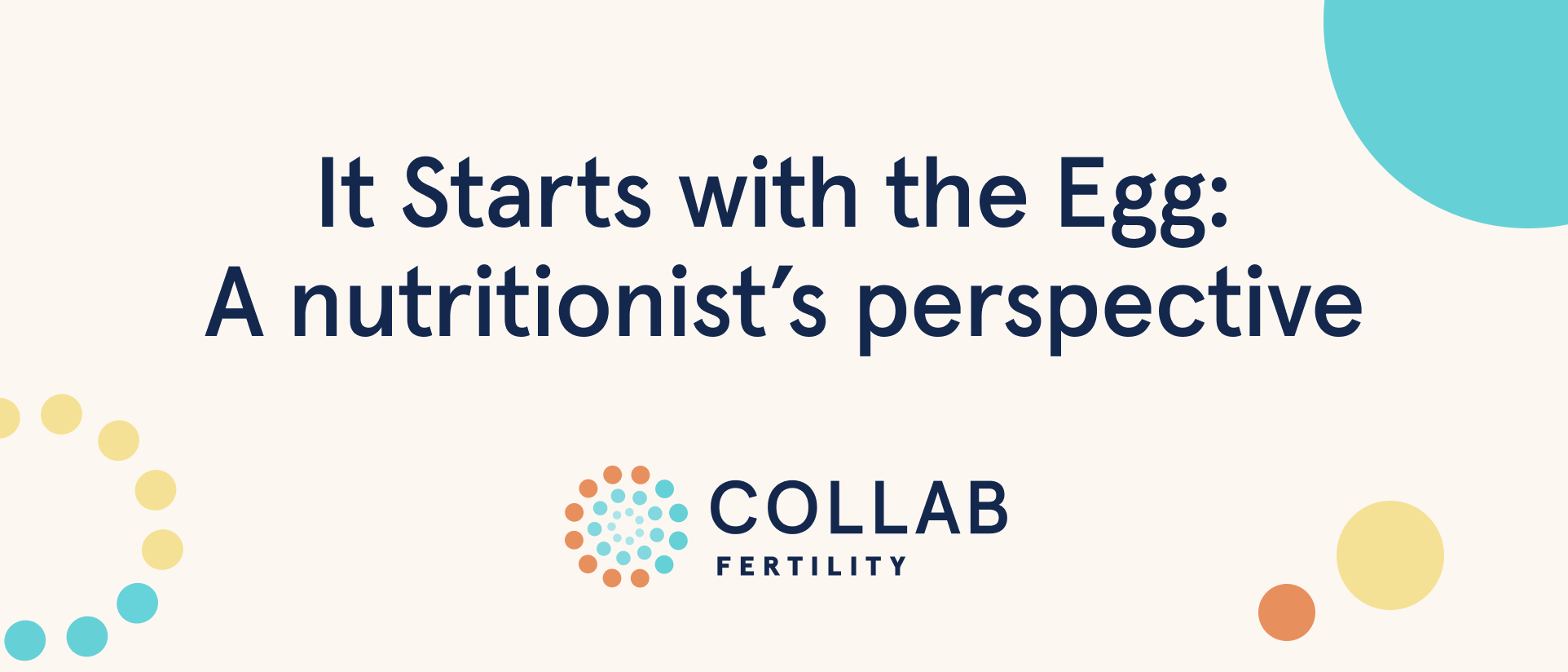
It Starts with the Egg: A nutritionist’s perspective
Does the viral book, It Starts with the Egg live up to the hype? If you’ve started a fertility journey, chances are someone has told you to read It Starts with the Egg. The bestselling book promises science-backed strategies to improve egg quality through supplements, diet, and lifestyle changes. We asked Collab Fertility’s dietitian, Mimi Huang, RD, about her take and to separate fact from fiction and share what patients really need to know.
Q: Do patients bring up It Starts with the Egg in your sessions?
Mimi: Yes, a few! I’m always excited when they do, because it means they’re being proactive and engaged. I like comparing notes and giving feedback on which recommendations are truly helpful. Even if patients don’t follow everything, reading the book shows they want to be informed and involved in their care.
Q: Overall, do you think the book It Starts with the Egg helps patients, or does it create more confusion?
Mimi: Both. Some patients benefit from starting certain supplements, the book suggests. But others end up taking a long list that may not help and sometimes may even be unnecessary or counterproductive.
Q: The book emphasizes supplements like CoQ10, DHEA, and melatonin. Which are supported by evidence?
Mimi: CoQ10 is one I strongly support. It’s well-studied for improving egg quality and sperm quality, especially for women over 35 or for people who don’t eat enough antioxidant-rich foods.
DHEA is more complicated—it’s a hormone, not a nutrient. It can help women with diminished ovarian reserve, but only if their baseline levels are low. If you already have normal or high DHEA, supplementing can backfire, raising testosterone, affecting cycles, mood, or even causing side effects like facial hair growth. It’s definitely not one-size-fits-all.
Melatonin has mixed evidence. I don’t typically recommend it as a first step, but for patients with poor sleep, it can be useful. Since sleep is important for hormone regulation, melatonin can indirectly support fertility.
Q: Does DHEA improve fertility for women over 40?
Mimi: Not automatically. Just being over 40 doesn’t mean you should take DHEA. It depends on your lab results and health history. That’s why personalized guidance from a doctor or dietitian is so important.
Q: What about supplements for embryo implantation?
Mimi: There’s no strong evidence that supplements directly improve implantation. Some research suggests vitamin E may help with uterine lining development, but that doesn’t necessarily mean higher implantation rates and high doses can be harmful. I usually encourage patients to get vitamin E from foods like avocados instead.
Q: The book also mentions L-arginine. Should patients take it?
Mimi: I don’t recommend it. Some studies have actually linked L-arginine with poorer embryo quality and lower pregnancy rates in IVF patients. The risks outweigh the potential benefits.
Q: How should someone decide which supplements are right for them?
Mimi: There’s no one-size-fits-all plan. I look at each patient’s health history, labs, and diet. For example, if someone doesn’t eat much fish, an omega-3 supplement makes sense. If they don’t eat enough fruits and vegetables, CoQ10 may be helpful. A good prenatal is always a safe baseline. Beyond that, it’s about tailoring recommendations to the individual.
Q: The book emphasizes reducing plastics and toxins. How much does science support this?
Mimi: Research shows clear links between certain plastics and reduced fertility outcomes. Plasticizers such as BPA and phthalates have been associated with lower fertilization rates, poorer embryo development, higher miscarriage rates, and lower pregnancy rates. For example, a study found that higher urinary BPA concentrations were linked to significantly poorer IVF outcomes (Mínguez-Alarcón et al., Human Reproduction, 2015).
While we can’t eliminate exposure completely—plastics and environmental toxins are everywhere, including in our food systems and even in reproductive organs—there are small, sustainable changes that can help reduce risk. Simple steps include using glass instead of plastic containers, switching to stainless steel or cast iron pans instead of non-stick, and choosing organic produce and meats when possible.
Q: How does the book address diet, and what’s your perspective?
Mimi: I like that it encourages whole grains instead of refined grains and emphasizes balancing blood sugar. It also highlights the Mediterranean diet rich in fruits, vegetables, fish, and healthy fats—which has been linked to both heart health and fertility support.
Q: Some patients feel anxious after reading the book. How do you support them?
Mimi: I see a lot of confusion, more than guilt. When someone is taking a long list of supplements, I walk through each one with them—why are you taking it, do you actually need it, is there evidence? Breaking it down reduces anxiety and helps patients feel more grounded. I will add that knowledge is empowering, as long as you don’t take everything at face value. It Starts with the Egg is a tool, not a rulebook. Use it as a starting point, then lean on your care team to figure out what’s right for your personal journey.
Key takeaway
It Starts with the Egg has sparked important conversations about how lifestyle, nutrition, and environment can influence fertility. But as Mimi reminds us, not every recommendation is right for every person. Some supplements are worth considering, others require medical guidance, and a few are best left behind. The real takeaway? Use the book as a starting point, not a rulebook—and lean on your care team to create a plan that’s safe, sustainable, and truly personalized for your fertility journey.
At Collab, this personalized approach is at the heart of The Collab Way—our integrative model that combines medical care with nutrition, environmental guidance, and emotional support to care for the whole person.
Interested in learning more about Mimi’s expert take on supplements and fertility? Read the Collab Journal Q&A where she shares what’s worth keeping, what to skip, and how to personalize your plan.
________________________
Proudly Supporting Local Communities
Collab Fertility is honored to serve families in the East Bay like Danville, Alamo, Orinda, Lafayette, Moraga, Piedmont, and Walnut Creek, as well as many other communities in the Bay Area and beyond, including Oakland, San Ramon, Concord, Pleasant Hill, Santa Rosa, Novato, Napa, Sonoma, and more.
Latest Articles

Jennifer’s and Yanbo’s IUI success story: how Collab helped us get pregnant after three years of trying

